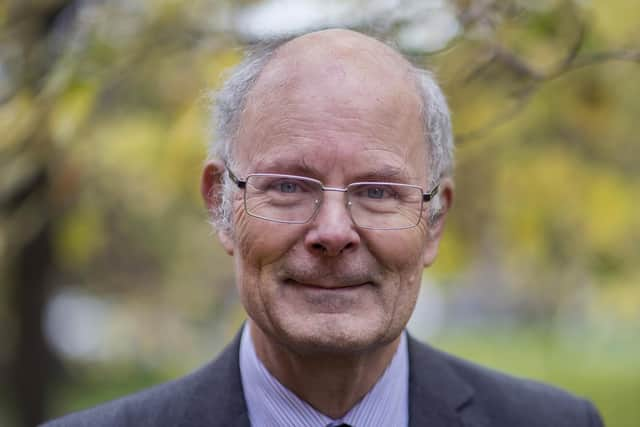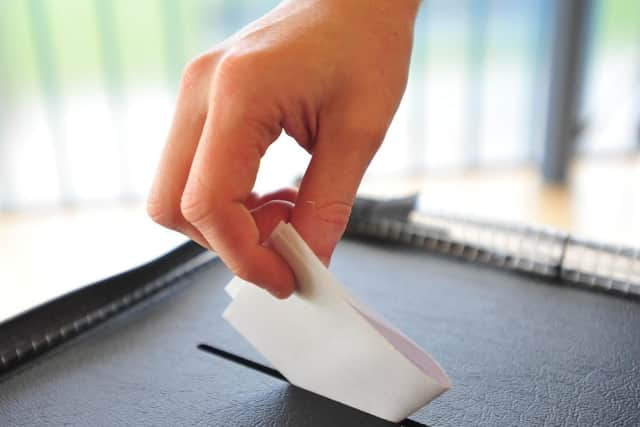Poll shows Labour narrow gap to SNP as Sir John Curtice says result 'makes every seat in Scotland a marginal at the next general election'
Every seat in Scotland at the next general election could be a marginal seat with it “all to play for” as Scottish Labour continue to narrow the gap on the SNP, polling guru Sir John Curtice has said.
The expert, speaking at a True North event on Wednesday analysing the latest polling from Survation, also said a strong Labour showing in Holyrood polling would leave the Conservatives as “kingmakers” after the 2026 Scottish Parliamentary election.
Advertisement
Hide AdAdvertisement
Hide AdThe polling showed Labour within two points of the SNP in terms of Westminster voting intentions on 35 per cent and the SNP on 37 per cent. The Conservatives were languishing behind on 17 per cent, with the gap between Labour and the SNP the lowest since the independence referendum in 2014.


Scottish independence support remains static, with support for Yes at 48 per cent and support for No at 52 per cent. This could lead Labour to win “two dozen seats” in Scotland, Sir John said.
He said: “If the Labour Party were hoping the internal disagreements and disputes within the SNP and within the Scottish Government coalition might have meant that the SNP lead over Labour would have narrowed significantly further, then the truth is that there’s not much sign of this.
“Labour would, frankly I think, both north and south of the border, be delighted if that were to be what transpires at the ballot boxes.
"Things so far as the possible seat outcomes are concerned could swing quite dramatically in one direction or the other in response to relatively small shifts in voting intentions because basically, as was the position after the 2017 general election when the SNP were also down to 37 per cent and Labour we running at around 29 per cent, that was enough to make pretty much every seat in Scotland a marginal seat.


“Certainly on these figures pretty much every seat in Scotland would be a marginal seat and therefore a relatively small increase in the SNP lead and all of a sudden those high expectations for Labour would not look quite so realistic. But equally if the Labour Party could actually overtake the SNP in voting intentions in Scotland, something they have not yet managed to do, they could indeed quite clearly be the dominant party so far as Scotland’s representation at Westminster is concerned.
"It certainly is all to play for.”
Sir John said it was the SNP leadership contest that had done “most of the damage” to the party. However, the arrest and subsequent release of Nicola Sturgeon did “discombobulate some SNP supporters”.
The polling also shows the SNP are still in the lead in terms of Holyrood voting intentions, with the SNP on 39 per cent, Labour on 34 per cent, the Conservatives on 16 per cent, and the Liberal Democrats on 8 per cent in regards to the constituency vote.
Advertisement
Hide AdAdvertisement
Hide AdOn the regional list, the SNP and Labour are on 30 per cent, the Conservatives on 15 per cent, Liberal Democrats on 9 per cent and the Greens on 9 per cent.
This would likely result in neither an SNP/Green or a Labour/Liberal Democrat coalition being able to govern without the support of the Conservatives, “essentially because of the weakness of the SNP”, Sir John said.
He added: “[This], of course, does mean that the Conservatives are potentially the kingmakers, a role of course that they de-facto were able to perform in the 2007 to 2011 Holyrood parliament.
"We do potentially face a situation at Holyrood from 2026 where it is going to be very difficult for anybody to run any kind of stable administration.”
Sir John said independence support was static, but that pro-independence voters were now beginning to “decouple” from the SNP. However, the hope from the Labour Party that them winning power would undermine independence support remains out of reach.
The polling expert said: “There is still absolutely no evidence at all in any of the polling that that hope and aspiration is being realised. What is happening, however, is the Labour Party is picking up a modicum of support of those people who are in favour of Yes in a way that they were not able to do six months ago … but it is still the case that the Labour Party is still dependent on those who voted No and indeed, without ‘Partygate’ and the Liz Truss administration, much of the Labour Party revival in Scotland wouldn’t have happened.”
Sir John said much of the SNP’s struggles were due to internal divisions and disagreements being put out into the open, something which began with the leadership contest.
With support for the SNP/Green deal at 28 per cent, with 40 per cent opposed, Sir John said: “The degree of the open debate that’s being going on inside the SNP about the merits of this deal … it’s pretty clear from this polling that that has indeed had an impact on public opinion.
"It is clear that the internal arguments have indeed have had some impact on SNP voters, though it is still the case that twice as many SNP voters approve of the deal than disapprove of it.”
Comments
Want to join the conversation? Please or to comment on this article.
